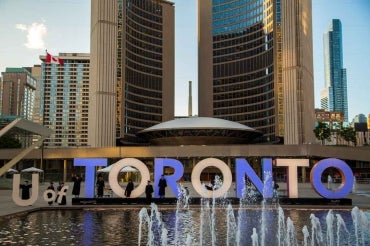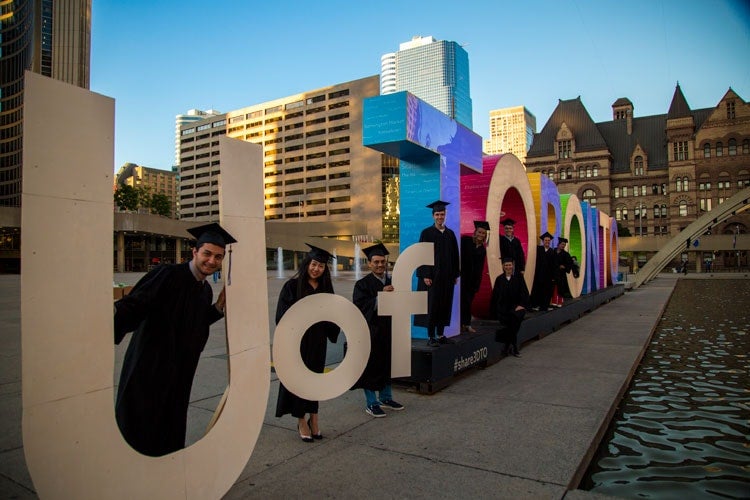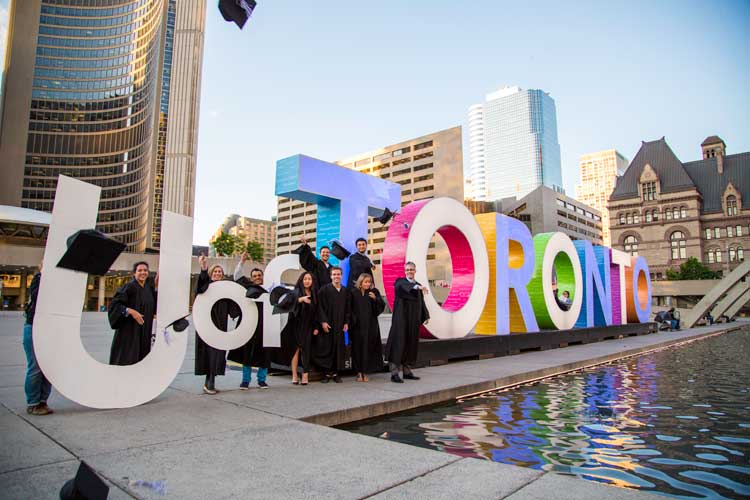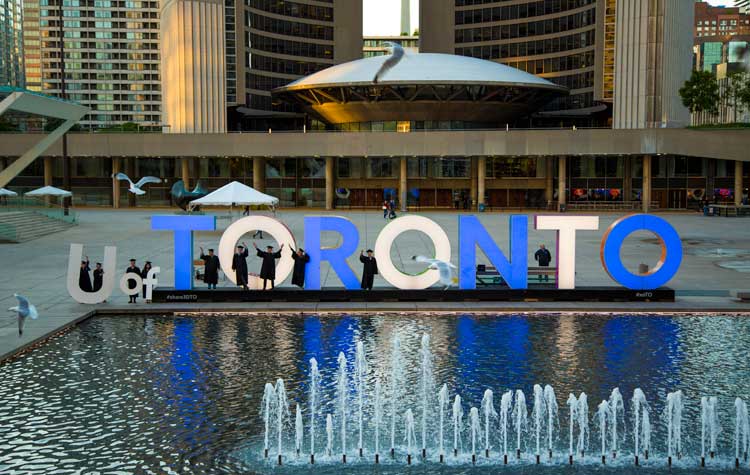#UofTGrad16: Six reasons why grads love TORONTO

Published: June 9, 2016
There are more than 18,000 members of the University of Toronto's Class of 2016 – with 13,500 graduating this spring alone from across the three campuses that anchor the Greater Toronto Area.
Are there 18,000 reasons to love Toronto?
The world's leading experts on cities live and work here, using the city as a living laboratory, a place to explore some of the most important urban issues of our time. But the connection for U of T students is just as strong.
They volunteer and conduct research in communities and neighborhoods across the GTA. They give shoutouts to the Raptors in valedictory speeches. Even Drake, our most famous non-grad, is celebrated as U of T Drizzy throughout U of T Scarborough.
And when the City of Toronto lights up its iconic sign in U of T blue and white during spring convocation, the Engineering students get busy. (Yes, that's plywood they used for their temporary addition. And yes, they trundled it down to Nathan Phillips Square themselves. U of T Engineers can build anything!)
U of T News asked some of the newest alumni from Canada's top-ranked university to name a few of their favourite things about living and learning one of the world's most diverse, vibrant and exciting urban centres.
Evan Rankin, JD (Law):
Community
“The city has a great sense of community,” says this native of Vancouver who already has a Master of Global Affairs degree from U of T.
“It’s metropolitan enough that no matter where you live, you can go and see your friends. So I have had a great time exploring the city and connecting with it that way.
“I’m connected to Toronto because I’ve had a great time exploring all the different communities.”
Chantel Leung BMus (Faculty of Music) in performance:
Concerts
“We were given access to a variety of concerts year-round,” says this double bassist from Markham, Ont. “Within the faculty, we were able to attend concerts at no cost.
“Most importantly, students could travel to the Toronto Symphony Orchestra and hear performances at a discounted price and attend their open rehearsals. This gave us a chance to learn and grow outside of the classroom.
“Furthermore, the Canadian Opera Company and National Ballet of Canada were also only a few minutes away. The countless concert opportunities in Toronto were invaluable and provided for an unparalleled experience.”

Francesca Hannan, BA (Trinity) in economics, environmental studies and environmental geography:
Activism
“What most connects me to Toronto is volunteering and activism. Working in my community, I've been exposed more fully to the range of backgrounds and lived experiences in our city's population.
“I think it's important to realize that we aren't just living in this city, but are building it together. And there is much to learn from our neighbours!”
Kikanwa Anyiwe, Master of Public Health in epidemiology:
Family
“Both of my parents are U of T alumni, and also my brother,” says this three-time U of T graduate. “I was excited to do my graduate work here because of the family connection.”
Kikanwa’s mother, Brenda Gayle-Anywe, a professor in the school of English and liberal studies at Seneca College, met her husband Godwin at U of T in 1973. They were married in the Knox College chapel five years later.
“It was important for our children to come here as well,” she says. “It means something to us in more ways than one.”

Zara Paris, BSc (University College) in psychology with minors in environmental science and political science:
Grassroots
"My minors are very broad topics,” says this resident of Oakville. “Nevertheless, I learned about the importance of grassroots movements in tackling major world issues.
“I began working at a Toronto-based NGO called Small Change Fund that funds community-level projects across Canada as well as here in Toronto.
“In this way, I am still using my education to address major worldwide issues such as food security and conservation, as well as social issues, but doing it from right here in Toronto."
Christen Dschankilic, Master of Forest Conservation:
Ravines
“Everyone is perplexed that U of T has a forestry program because it’s in the city,” says this resident of Pickering who earned her undergraduate degree at University of Toronto Scarborough. “How can you practise forestry in the city?
“Well, I got into urban forestry and street trees and urban forests, all of which resonate with Toronto. One of the reasons that this is so prominent in the Faculty of Forestry is because of Toronto’s ravines.
“From this urban perspective, U of T is pretty unique. We’ve gone on forestry trips to other cities and other places. One thing that sets Toronto apart is its natural heritage in the form of ravines.”




